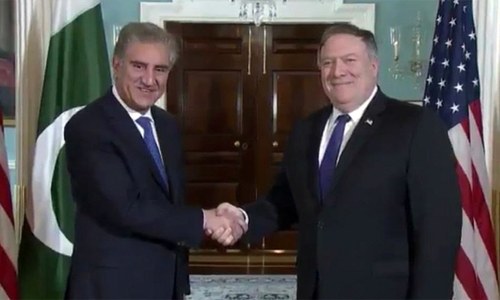KABUL: Afghan President Ashraf Ghani urged thousands of prominent citizens gathered in Kabul on Friday to decide whether to release about 400 Taliban prisoners, including many involved in attacks that killed scores of Afghans and foreigners.
The prisoners’ fate is a crucial hurdle in launching peace talks between the two warring sides, which have committed to completing a prisoner exchange before the talks can start.
The Afghan government has released almost 5,000 Taliban inmates, but authorities have balked at freeing the final prisoners demanded by the Taliban.
Ghani stressed that peace talks could begin in days if the prisoners were freed, while adding that he would “strongly endorse and support any decision”.
“The Taliban said if these 400 are released, then within three days direct talks will start,” Ghani said as he opened the three-day loya jirga — a traditional Afghan meeting of tribal elders and other stakeholders sometimes held to decide on controversial issues.
Taliban question legal basis of the assembly
“If they are not freed, not only would they continue the war but they would intensify it. But it was not possible to release them without consulting the nation.”
US Secretary of State Mike Pompeo pushed for the release of the detainees, while recognising the decision would be “unpopular”.
“But this difficult action will lead to an important result long sought by Afghans and Afghanistan’s friends: reduction of violence and direct talks resulting in a peace agreement and an end to the war,” he said in a statement.
Lawmaker Belquis Roshan, a prominent women’s rights activist attending the gathering, protested against the release of the prisoners.
As Ghani spoke, she stood in the hall and unfurled a banner that read: “Redeeming Taliban is national treason.”
According to an official list of the Taliban prisoners, many of the inmates are accused of serious offences, with more than 150 of them on death row.
The list also includes a group of 44 insurgents of particular concern to the United States and other countries for their role in “high-profile” attacks.
They include five insurgents linked to the 2018 attack on the Intercontinental Hotel in Kabul that killed 40 people, including 14 foreigners.
A Taliban militant involved in the massive May 2017 truck bombing near the German embassy in Kabul is also on the list, which includes a former Afghan army officer who killed five French troops and wounded 13 in 2012 in an insider attack.
“There are definitely some prisoners that people don’t want released, mostly because they are guilty of having killed coalition troops and nationals,” a Western official familiar with the case said on condition of anonymity.
About 3,200 dignitaries are participating in the three-day assembly, Masoom Stanekzai, the head of the organising committee, said.
Abdullah Abdullah, who will lead peace talks with the Taliban, told the loya jirga that the decision was a “matter of life and death for people of Afghanistan”, while also pledging to respect their recommendation which is not legally binding.
The Taliban, who have fulfilled their side of the prisoner swap, dismissed the jirga, saying it had no legal base.
“Seventy per cent of the country is controlled by the Islamic Emirate (of Taliban). How can this jirga represent all Afghans?” Taliban spokesman Suhail Shaheen asked.
According to the prisoner list, the Taliban are also demanding the release of an insurgent involved in a 2018 attack against British security firm G4S as well as several militants involved in the killing of US soldiers.
Two militants involved in a suicide attack targeting a Nato convoy in Kabul in 2015 that killed 12 people, including three Americans, were also among the 400.
Published in Dawn, August 8th, 2020














































